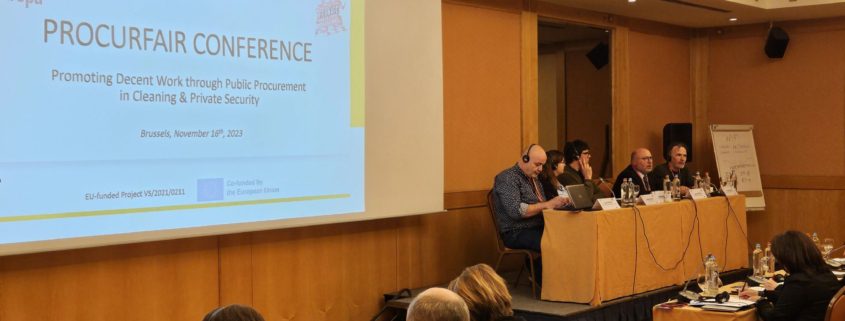Discussing public procurement approaches in Europe: EFCI at the Procurfair project final conference
Last November 16 EFCI President Lorenzo Mattioli took part in the final conference of the EU project “Procurfair”, launched by UNIEuropa, to which EFCI contributed supporting the research activities and the collection of information. The project aimed at investigating how public procurement rules – and specific contractual provisions or implementation of such rules – have contributed in expanding the achievement of social objectives (improved working conditions, increased involvement of workers’ representation mechanisms, etc..) through public contracts in the cleaning and private security sectors. In particular, the project focused on six EU-countries, and developed reports at both national and sectoral levels.
President Mattioli was invited to share the view of the industrial cleaning sector, stressing the strong commitment of employers in the cleaning industry to guarantee the respect of the highest employment standards and the strict observance of labour legislation, in all its dimensions. Employers are in the first line to prevent the recourse to illegal work practices, which undermine competitiveness and are in the first place a threat to the conduct and sustainability of those companies that play by the rules. And those cases where additional obligations are imposed by local procurement authorities – some of which were precisely mentioned during the conference as good examples of innovative procurement practices – actually risk being counterproductive, as they create uneven and unfair operational conditions for companies, distorting competition. “Companies are always willing to cooperate with public authorities and labour inspectorates to ensure the respect of legislation, but cannot be asked to perform this fundamental responsibility on their behalf”, pointed out Mr. Mattioli. Instead, to enhance public procurement as a driver of better, more socially advanced and innovation-oriented employment and contractual conditions, a revision of the rules pertaining to the financial dimension is required. “The lowest price criterion remains the main awarding principle in the majority of public contracts”, reminded Mr. Mattioli. “In these conditions, quality stops being the most relevant objective to pursue. This race-to-the-bottom approach must change, and procurement agencies have to facilitate this transition with a different, more bold approach” concluded Mr. Mattioli.






